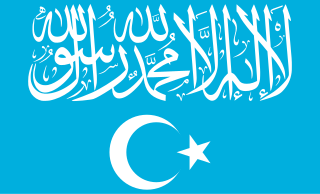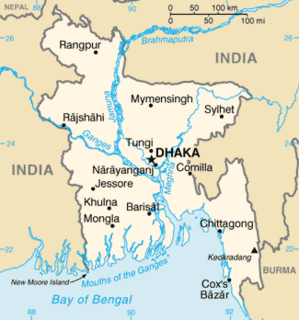
Al-Qaeda, officially known as Qaedat al-Jihad, is a multinational militant Sunni Islamic extremist network composed of Salafist jihadists. It was founded in 1988 by Osama bin Laden, Abdullah Azzam, and other Arab volunteers during the Soviet–Afghan War.

Deobandi is a revivalist movement within Sunni Islam, adhering to the Hanafi school of law, formed in the late 19th century around the Darul Uloom Madrassa in Deoband, India, from which the name derives, by Muhammad Qasim Nanautavi, Rashid Ahmad Gangohi, and several others, after the Indian Rebellion of 1857–58. The movement pioneered education in religious sciences through the Dars-i-Nizami associated with the Lucknow-based ulema of Firangi Mahal with the goal of preserving Islamic teachings under colonial rule. The Deobandi movement's political wing, Jamiat Ulema-e-Hind, was founded in 1919 and played a major role in the Indian independence movement through its propagation of the doctrine of composite nationalism.

The Turkistan Islamic Party (TIP) or the Turkistan Islamic Movement (TIM), formerly known as the East Turkestan Islamic Movement (ETIM) and other names, is a Uyghur Islamic extremist organization founded in Western China. Its stated goals are to establish an independent state called East Turkestan replacing Xinjiang. The UN Security Council Al-Qaida Sanctions Committee has listed ETIM as a terrorist organization since 2002. The United States removed it from its list of Terrorist Organizations in 2020.

Islamic terrorism refers to terrorist acts with religious motivations carried out by fundamentalist militant Islamists and Islamic extremists.

Lashkar-e-Taiba is a militant Islamist organisation operating against India in Pakistan. It was founded by Hafiz Saeed, Abdullah Azzam and several other Islamist mujahideen with funding from Osama bin Laden during the Soviet-Afghan War. The organisation is allegedly part of Operation Tupac and trained and funded by the Pakistan Army and the Inter-Services Intelligence.

Jamaat-e-Islami, or Jamaat as it is simply known, is an Islamist political party which is based in Pakistan and it is the Pakistani successor to Jamaat-e-Islami, which was founded in colonial India in 1941. Its objective is the transformation of Pakistan into an Islamic state, governed by Sharia law, through a gradual legal, and political process. JI strongly opposes capitalism, communism, liberalism, socialism and secularism as well as economic practices such as offering bank interest. JI is a vanguard party: its members form an elite with "affiliates" and then "sympathizers" beneath them. The party leader is called an ameer. Although it does not have a large popular following, the party is quite influential and considered one of the major Islamic movements in Pakistan, along with Deobandi and Barelvi.

Jaish-e-Mohammed is a Pakistan-based Deobandi Jihadist militant group active in Kashmir which is widely considered as a terrorist group. The group's primary motive is to separate Kashmir from India and merge it into Pakistan.

Harkat-ul-Jihad-al-Islami is a Pakistani Islamic fundamentalist Jihadist organisation affiliated with Al-Qaeda, Taliban.

Jamaat-ul-Mujahideen is an Islamic terrorist organisation operating in Bangladesh. It is also listed as a terror group by the United Kingdom. It was founded in April 1998 in Palampur in Dhaka Division by Abdur Rahman and gained public prominence in 2001 when bombs and documents detailing the activities of the organisation were discovered in Parbatipur in Dinajpur district. The organisation was officially declared a terrorist organisation and banned by the government of Bangladesh in February 2005 after attacks on NGOs. But it struck back in mid-August when it detonated 500 small bombs at 300 locations throughout Bangladesh. The group re-organised and has committed several public murders in 2016 in northern Bangladesh as part of a wave of attacks on secularists.
Jihadism is a neologism which is used in reference to "militant Islamic movements that are perceived as existentially threatening to the West" and "rooted in political Islam." Appearing earlier in the Pakistani and Indian media, Western journalists adopted the term in the aftermath of the September 11 attacks of 2001. Since then, it has been applied to various insurgent Islamic extremist, militant Islamist, and terrorist individuals and organizations whose ideologies are based on the Islamic notion of jihad.

The Islamic Jihad Union is a militant Islamist organization founded in 2002 as a splinter group of the Islamic Movement of Uzbekistan (IMU). Headquartered in North Waziristan, a mountainous region of northwest Pakistan, bordering Afghanistan, the group has been affiliated with both Al-Qaeda and the Taliban.
Mujahideen, or Mujahidin, is the plural form of mujahid, an Arabic term that broadly refers to people who engage in jihad, interpreted in a jurisprudence of Islam as the fight on behalf of God, religion or the community (ummah).
Pakistan and state-sponsored terrorism refers to the involvement of Pakistan in terrorism through the backing of various designated terrorist organizations. Pakistan has been frequently accused by various countries, including its neighbours Afghanistan, India, and Iran, as well as by the United States, the United Kingdom, Germany, and France, of involvement in a variety of terrorist activities in both its local region of South Asia and beyond. Pakistan's northwestern tribal regions along the Afghanistan–Pakistan border have been described as an effective safe haven for terrorists by Western media and the United States Secretary of Defense, while India has accused Pakistan of perpetuating the insurgency in Jammu and Kashmir by providing financial support and armaments to militant groups, as well as by sending state-trained terrorists across the Line of Control and de jure India–Pakistan border to launch attacks in Indian-administered Kashmir and India proper, respectively. According to an analysis published by the Saban Center for Middle East Policy at the Brookings Institution in 2008, Pakistan was reportedly, "with the possible exception of Iran, perhaps the world's most active sponsor of terrorist groups... aiding these groups that pose a direct threat to the United States. Pakistan's active participation has caused thousands of deaths in the region; all these years Pakistan has been supportive to several terrorist groups despite several stern warnings from the international community." Daniel Byman, a professor and senior analyst of terrorism and security at the Center For Middle East Policy, also wrote that, "Pakistan is probably 2008's most active sponsor of terrorism". In 2018, the former Prime Minister of Pakistan, Nawaz Sharif, suggested that the Pakistani government played a role in the 2008 Mumbai attacks that were carried out by Lashkar-e-Taiba, a Pakistan-based Islamist terrorist group. In July 2019, Pakistani Prime Minister Imran Khan, on an official visit to the United States, acknowledged the presence of some 30,000–40,000 armed terrorists operating on Pakistani soil. He further stated that previous administrations were hiding this truth, particularly from the United States, for the last 15 years during the War on Terror.

Jamaat-e-Islami is an Islamic movement founded in 1941 in British India by the Islamic theologian and socio-political philosopher, Syed Abul Ala Maududi. Along with the Muslim Brotherhood, founded in 1928, Jamaat-e-Islami was one of the original and most influential Islamist organisations, and the first of its kind to develop an ideology based on the modern revolutionary conception of Islam.
Jihadi tourism, also referred to as jihad tourism or jihadist tourism, is a term sometimes used to describe travel to foreign destinations with the object of scouting for terrorist training. US diplomatic cables made public by WikiLeaks in 2010 have raised concerns about this form of travel. Within intelligence circles, the term is also sometimes applied dismissively to travellers who are assumed to be seeking contact with extremist groups mainly out of curiosity.

Al-Qaeda in the Indian Subcontinent usually abbreviated as AQIS, is an Islamist militant organization which aims to fight the governments of Pakistan, Afghanistan, India, Myanmar and Bangladesh in order to establish an Islamic state.
Sana-ul-Haq, better known as Asim Umar, was an Indian militant and the leader of al-Qaeda in the Indian Subcontinent. al-Qaeda leader Ayman al-Zawahiri announced the creation of AQIS and introduced Asim Umar as its leader in a video posted online in September 2014.
Tufail Ahmad is a British journalist and political commentator of Indian origin. He has been the Director of the South Asia Studies Project at the Middle East Media Research Institute (MEMRI) in Washington, D.C. In his recent writings, he was described as a Contributing Editor at Firstpost and as Executive Director of the Open Source Institute (OSI), New Delhi.

Islamic State in Iraq and the Levant (ISIL), also known as Islamic State in Iraq and Syria (ISIS) and Islamic State (IS), has been increasingly active in Bangladesh since 2015. Home-grown militant groups have associated themselves with ISIL. It is uncertain whether attacks in Bangladesh are orchestrated by ISIL, are independently planned and claimed by the group, or are later attributed to ISIL. ISIL's targets in Bangladesh are often foreigners, secular bloggers or journalists who are vocal in their opposition to the enforcement of Sharia law and the establishment of an Islamic state.
Bleed India with a Thousand Cuts is a military doctrine followed by the Pakistani military against India. It consists of waging covert war against India using insurgents at multiple locations. According to scholar Aparna Pande, this view was put forward in various studies by the Pakistani military, particularly in its Staff College, Quetta. Peter Chalk and Christine Fair cite the former director of the Inter-Services Intelligence (ISI) explicating the strategy.










